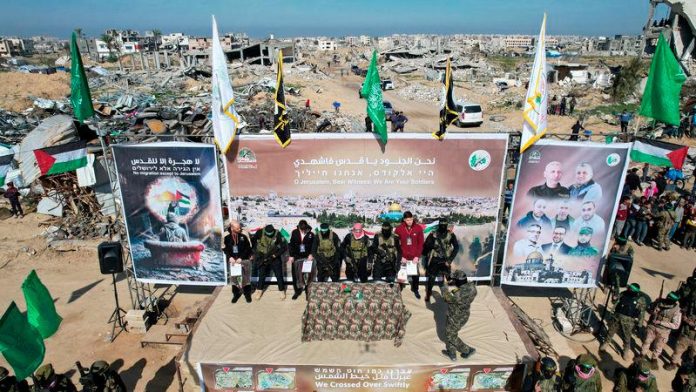CAIRO/JERUSALEM: Israeli hostages Iair Horn, Sagui Dekel-Chen and Sasha (Alexander) Troufanov were freed in Gaza on Saturday and Israel began releasing some 369 Palestinian prisoners and detainees in exchange, after mediators helped avert a ceasefire collapse.
The three Israelis were led onto a stage with Palestinian Hamas militants armed with automatic rifles standing on each side of them at the site in Khan Younis, live footage showed, before they were taken into Israel by Israeli forces.
Shortly afterwards, the first bus carrying freed Palestinian prisoners and detainees departed Israel’s Ofer jail in the Israeli-occupied West Bank, live footage showed. The bus arrived in Ramallah to a cheering crowd, some waving Palestinian flags.
The swap of the three Israelis for the 369 Palestinians eased fears that the ceasefire agreement could collapse before the end of the 42-day first stage of a ceasefire deal in effect since January 19.
In what has become known as Hostage Square in Tel Aviv, people broke into cheers and tears when they heard the Red Cross was on its way to deliver the three to Israeli military forces in the Gaza Strip.
They appeared relieved to see that the trio was in apparently better physical condition than another three freed last week who appeared emaciated and weak.
Residents of Israeli kibbutz communities near the Gaza border lined the road cheering and waving Israeli flags as the vehicles carrying the hostages out of Gaza passed by.
Dekel-Chen, a U.S.-Israeli, Troufanov, a Russian Israeli, and Horn, whose brother Eitan was also abducted, were seized in Kibbutz Nir Oz, one of the communities around the Gaza Strip that was overrun by Hamas gunmen on October 7, 2023.
Some of the dozens of masked Islamist Hamas fighters deployed at the handover site carried rifles seized from the Israeli military during the October attack, Hamas sources said.
On the handover stage in Khan Younis, the hostages were made to give short statements in Hebrew and militants presented one of them, Iair Horn, with an hourglass and photo of another Israeli hostage still in Gaza and his mother, reading “time is running out (for the hostages still in Gaza)”.
Troufanov was abducted with his mother, grandmother and girlfriend – all of whom were released in the brief November 2023 truce. His father was killed in the attack on Nir Oz, one of the worst-hit communities, where one in four people either died or were taken hostage.
On October 7, Dekel-Chen, 36, left his pregnant wife and two little daughters in the family safe room to go out and fight the gunmen rampaging through the kibbutz. With his release, he will meet his youngest daughter for the first time.
Argentina-born Horn, 46, who managed the Nir Oz pub, was taken captive together with his younger brother Eitan who was visiting that day. Horn appeared to have lost considerable weight in captivity.
“Now, we can breathe a little. Our Iair is home after surviving hell in Gaza. Now, we need to bring Eitan back so our family can truly breathe,“ Horn’s family said in a statement.
Nineteen Israeli and five Thai hostages have been released so far, with 73 still in captivity, around half of whom have been declared dead in absentia by Israeli authorities.
THREATS
Hamas had earlier threatened not to release more hostages after it accused Israel of violating the terms of the ceasefire by blocking aid from entering Gaza, drawing counterthreats of a resumption of fighting from Israel, which called up reservists and placed its forces on high alert.
The emaciated appearance of the three hostages freed last week and accounts of abuse by other hostages released since January 19 when the truce took effect have set off Israeli protests demanding the government stick to the ceasefire and pursue the next stage to bring all remaining hostages home.
In an apparent effort to head off some of the criticism of hostage mistreatment, Islamic Jihad, the militant group that is allied with Hamas and held Troufanov, released a video of him on Friday, showing him eating and fishing at the Gaza beach.
Prospects for the ceasefire surviving have also been clouded by U.S. President Donald Trump’s call for Palestinians to be moved permanently out of Gaza, and for the enclave to be turned over to the U.S. to be redeveloped. That call was flatly rejected by Palestinian groups, Arab states and Western allies.
Hamas agreed last month to hand over 33 Israeli hostages, including women, children and sick, wounded and older men, in return for hundreds of Palestinian prisoners and detainees, during a six-week truce during which Israeli forces would pull back from some of their positions in Gaza.
Before Saturday, 16 of the 33 Israeli hostages had been returned, along with five Thais who were handed over in an unscheduled release. That left 76 hostages still in Gaza, only around half of whom are thought to be alive.
The truce was intended to open the way for a second phase of negotiations to return remaining hostages and complete the withdrawal of Israeli forces before a final end to the war and the rebuilding of Gaza, which now lies largely in ruins, facing shortages of food, running water and electricity.
Israel invaded the coastal enclave after the Hamas-led attack on communities in Israel on October 7, 2023, killing about 1,200 people, according to Israeli tallies, and taking 251 as hostages.
The Israeli military campaign that followed has killed more than 48,000 Palestinians in Gaza, according to Palestinian health ministry figures, destroyed many of its buildings and left most of the population homeless.








